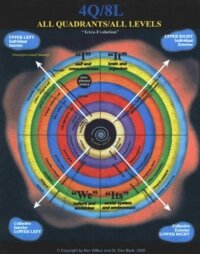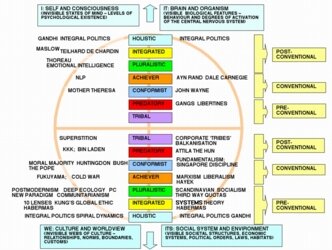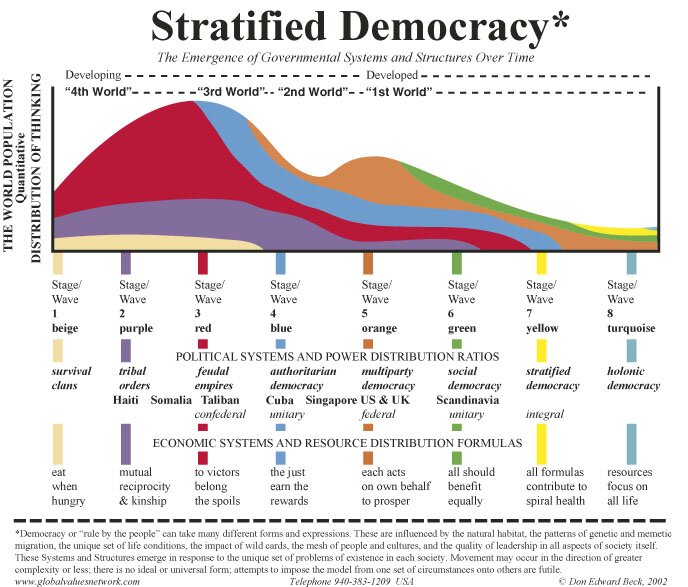BIRTH AND DEVELOPMENT
OF INTEGRAL POLITICS
 (Click to enlarge)
(Click to enlarge)
|
The traditional Left-Right axis misses most of the true complexity of reality and ingrains no-win political clashes. By contrast an 'Integral' map of reality -- like this initial attempt -- aims to embrace as many partial truths as possible -- enabling systemic solutions and policies to be designed. The left-hand side shows individuals' intentions, meanings, culture and worldviews (described using 'I' and 'We' language), the right-hand side shows the visible behaviours in individuals, institutions and societies (described using 'It' language). And running through all the four quadrants -- the emergence of new levels of complexity. |
The Problem
Who's Listening?
What needs integrating?
Human Nature: integrating Left and Right views
Critics respond
Join in
Welcome to the Integral Politics portal -- entry point to resources and activities around the emerging Integral approach to politics, which aims to challenge today's partial and piecemeal approaches with those that are more comprehensive, holistic, systematic and encompassing.
This approach is being pioneered by individuals such as Ken Wilber and Dr Don Beck. Dr Beck field-tested the Integral approach when working with Nelson Mandela on the hugely complex transition beyond apartheid in South Africa -- and, more recently, gave a presentation to the World Bank on how to rebuild Afghanistan.
The Problem
For decades rising complexity in the world along with increasing inequality, ecological and economic chaos has left conventional politics reeling. Globalisation forces us to consider the vast range of different levels of development and each group of people bring a wide range of worldviews and needs to the world-table. Our global political institutions cannot keep up and mass pressure groups are having little impact. This complexity has never been seen before in history.
How can we create a new politics that will cope with it? How can we create a path beyond the fragmentation and alienation that can seem to define our modern world?
Who's listening?
The emerging Integral Politics approach has already caught the attention of advisors to Clinton, Gore, Blair and the Bushes (Bill even gave one Wilber book on how to integrate religion and science to Al who called it "one of my favorite new books" in a later New Yorker article he wrote).
In the UK, leading Blair advisor Geoff Mulgan urged all the Government's key future strategists to study the Integral approach and try to put it into action in their new policies.
Integral Politics practitioners also achieved the feat of bringing together in dialogue the radical activists of the World Social Forum with their nemesis, the global business leaders of the World Economic Forum.
Recognising the importance of Wilberís Integral vision, Prof. Charles Taylor - possibly the world's most respected living philosopher - said: "I have tremendously appreciated Wilber's work. He has managed to integrate so many things, and to keep his horizons open, where most of our culture keeps closing them down. It is magnificent work."
What needs integrating?
The Integral vision (the Integral Institute's outline) tries to transcend the usual partial and partisan approaches that exist across Left and Right. To achieve this, it balances both the external world (of skills, policies, institutions, governments) with the internal world (of personal values and meanings, transformations and shared cultural worldviews).
On the two four-quadrant graphics, development in the external world is shown on the right side of each graphic, and the corresponding development in the internal world on the left. And when this inside and outside are also divided into both the individual and the social realms then a comprehensive four quadrant model is the result.
Through extensive cross-cultural research Integral theorists have built a comprehensive map of human capacities which outline the potential for people's worldviews and values etc to develop from egocentric/selfish goals through to group/ethnocentric care and sometimes on to worldcentric/global care and beyond. This has also been described as a move from a self that is 'impulsive' to a self that is 'conformist' to a self that is 'autonomous'. This evolution in peopleís modes of thinking is ignored in most political analyses, which usually favour one mode.
To give an example, one school of Integral thinking, Spiral Dynamics, found that 8 different thinking systems -- or levels - can emerge consecutively, depending on the complexity of life conditions being faced. A new project aims to map these invisible value systems - or value memes - globally in a 'Global Memome Project' - to help people see right through the current 'flatland' -- no levels - ideology to humanitiesí complex shared interior values. Ongoing mapping may in future predict conflict hotspots and other major developments.)
Integral models are also known as 'All Levels, All Quadrants' models as they attempt to foster healthy development in all quadrants and all levels -- without the privileging of favoured approaches that plagues conventional politics and renders it pretty hopeless at designing successful solutions to urgent problems. To give an example, the Green movement (see Integral Politics graphic) tends to privilege the communitarian/puralistic level in the Lower Right (external, social world) quadrant.
Human nature: integrating Left and Right views
A further integration of 'competing' outlooks is achieved with the understanding that political approaches will all tend to choose either to blame society's problems on external circumstances (eg oppressive social inequalities), as the Left usually does, or internal factors (e.g. morals, character and self-responsibility - or rather their lack) - the common conservative approach.
Clearly neither alone has the whole answer.
Despite often reaching a high level of global care, the Left is so focused on these external inequalities that it does not even mention that interior growth is needed alongside external improvements in any balanced political approach. The external changes (reducing poverty, pollution, war etc.) are certainly important - but unless more people are thinking from the -- currently rare -- level of global care they won't even want to seek these important goals in the first place. Whereas those who have reached a level of global concern will be moved from within to deal with these problems, without the need to impose ever more law and regulation.
In one of the oddest twists of politics, liberal/left approaches today find it just not PC to urge others to also reach higher levels of care, as that might entail judging other less compassionate worldviews, when all views are said to be equal. The Left thus ignores or even blocks the very human consciousness transformations that are needed to enable people to reach the level of global tolerance and care that might deliver many of the goals it seeks.
In this way, the liberal/left approach can end up with a tractionless multiculturalism where no interior is better than any other. Whilst it is vital to embrace global diversity - we must also find the links that join the cultures, the commonalities, and move from pluralism to Integralism.
Conservative approaches avoid this contradiction, they still urge some development of the self beyond impulsive egocentrism. Yet sometimes what they seek is so limited that conservatives can often remain mired in the bigotries of ethnocentrism, sexism and so on.
"So here is the truly odd political choice that we are given today: a sick version of a higher level versus a healthy version of a lower level - liberalism versus conservatism", laments Ken Wilber in A Theory of Everything - An Integral Vision for Business, Politics, Science, and Spirituality, a highly recommended introduction to the Integral approach.

(Click to enlarge)
|
Politics, leaders, ideas -- mapped onto all the quadrants and levels.
Positions are only initial rough suggestions, to illustrate the spread that comes into view -- once we look beyond 'flatland' politics-as-usual. No particular quadrant or level is privileged in Integral politics, the removal of blockages to healthy development is sought throughout all quadrants and levels. Send suggested improvements to Matthew Kalman |
Critics respond
Unfortunately any such Integral models which appear to suggest 'universal' hierarchies of human development are today controversial, not Politically Correct (even though such potentials are open to all of us).
For example, renowned feminist researcher Carol Gilligan is commonly -- and wrongly -- cited by critics to disprove that there is any shared pattern of moral development across both sexes. In fact her influential research did uncover a hierarchical shift from 'selfish' to 'care' to 'universal care' in both men's and women's ways of thinking -- and has been included in Integral models like Wilberís.
Perhaps due to the legacy of partriarchy and other elitisms, it is unfortunate that most people today cannot distinguish healthy developmental hierarchies of increasing human actualisation (little different from the natural development acorn to sapling to oak) from oppressive hierarchies of domination (such as patriarchy).
Join us
Make yourself at home in this site - and join us in helping the worldwide emergence of a range of Integral political analyses and solutions.
One size does not fit all: a Spiral Dynamics graphic produced by Don Beck to roughly illustrate the spread of value systems across the globe and the kind of political systems he suggests are likely to fit best with each value system. The Spiral Dynamics model can predict how the idealistic rush to impose Western liberal democracy in Afghanistan will likely backfire. Since available leadership in Afghanistan is still within Red, the only hope is 'nation-building by stealth' over a ten year period -- with the slow introduction of forms of basic democracy and leadership development.
